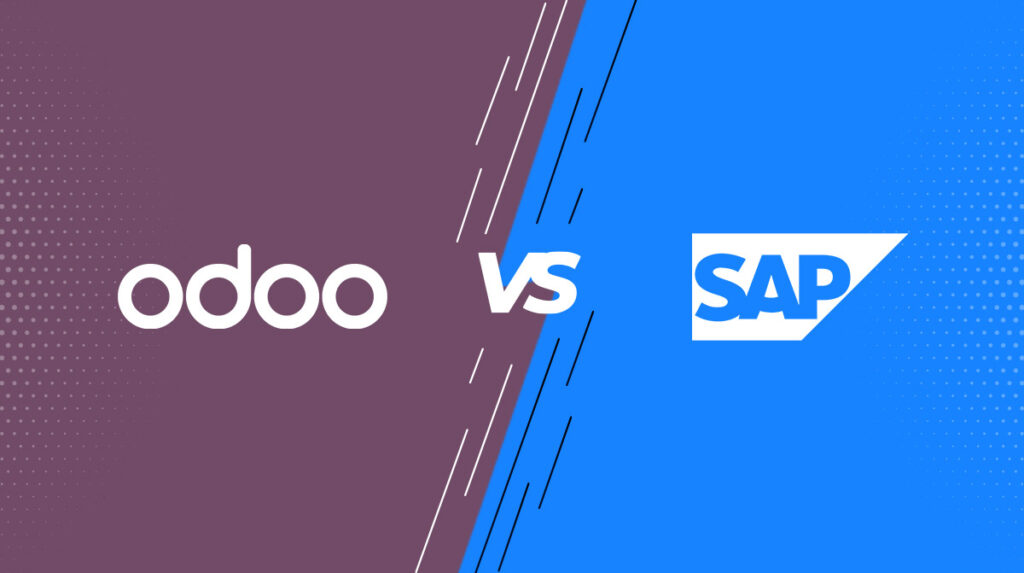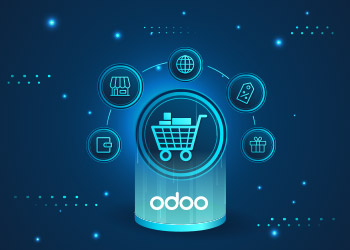Businesses today are more dynamic than ever. Every organization aims to put its best foot forward, attract the best potential customers, and boost profitability.
However, it’s easier said than done!
Access to multiple operations at different levels, talent management, and boosting customer retention efforts require more than the right talent. ERP (Enterprise Resource Planning) software is needed to streamline informational flow and operations.
ERP systems are an integral part of business as they effectively enhance productivity, manage resources, and make data-driven decisions that reinforce ERPs role in optimizing operations.
Odoo & SAP: The Two Leading ERPs
As we explore the dynamic world of ERP software, we see that two prominent players—Odoo and SAP—have disrupted the market like none other. Thanks to their continuous updates, the fight between these two ERP suites in 2024 will be more exciting than ever.
Therefore, let’s learn more about these two ERPs and how they help organizations increase productivity, streamline operations, and open up new growth opportunities.

What is Odoo?
Odoo ERP is an open-source software that recently became extremely popular. It takes a modular approach, allowing organizations to cherry-pick and easily integrate various components based on their needs. Odoo is built on a sophisticated app suite covering sales, inventory, accounting, human resources, etc.
What distinguishes Odoo is its flexibility and adaptability—a customizable solution tailored to the specific needs of organizations of all sizes. The platform stands out as a ready-to-integrate software solution that’s growing at the rate of 35%. However, that’s not all! It’s best standout point is that Odoo can be customized according to the individual requirements of different companies.
Key features of Odoo:
- Modular design: Choose among hundreds of modules that streamline operations in your workflow.
- Customization: Customize the ERP to align with your unique business requirements.
- Open-source: Access a wide range of add-ons and community-driven upgrades to ensure seamless operations.
- Flexible pricing: Pay for the modules you choose based on usage, making it affordable for SMEs.
Odoo is not merely an ERP; it’s a dynamic, evolving solution that grows with your business, reflecting the beauty of customization that Odoo ERP services bring.
What is SAP?
Next, we have SAP, a seasoned veteran of the ERP business known for providing highly scalable, comprehensive solutions. It has a significant presence among major organizations and global corporations, where the platform provides complete prowess over their operations.
What distinguishes SAP is its extensive range of industry-specific modules, which include finance, supply chain, manufacturing, human resource management, and customer relationship management.
In the complex ERP world, SAP’s capabilities go beyond conventional functionality. It acts as a strategic ally, enabling organizations to adjust their strategy to individual requirements. This versatility is evident in SAP’s modular architecture and dedication to keeping up with changing industry demands. What’s more? SAP serves over 92% of Forbes Global 2000 companies, making it one of the best go-to options for organizations across the globe.
Key features of SAP:
- Industry-specific modules: Can be customized for sectors like healthcare, finance, and manufacturing.
- Enterprise-grade: Suitable for organizations, from startups to MNCs, at every step of their operations.
- Integration capabilities: Seamless integration with other third-party enterprise systems.
- Extensive support: Offers dedicated service and professional training teams for smooth implementation.
Now that we know both ERPs let’s understand the importance of choosing the right one for your business.
Importance of Choosing the Right ERP for Your Business
Given the prominence of both software, many organizations find themselves confused between Odoo vs. SAP for their business. However, no matter the ERP suite, it’s essential to understand the importance of choosing a suitable system for your business.
Let’s have a closer look at the significance of choosing a suitable ERP for your operations:
- Enhanced Insight and Visibility
ERP software offers access to critical company operations by accumulating data from many departments and making it available to top management.
The increased visibility gives decision-makers the knowledge they need to oversee everyday operations, correct ineffective procedures, and identify growth prospects.
- Better Reporting and Analytics
Accurate and thorough reporting enables organizations to forecast, plan, budget, and communicate the status of operations to the company and external stakeholders, such as investors and shareholders.
ERPs make big data and business work well together because they provide your team with a unified analytics and reporting solution for all processes. It enables your team to study and compare functionality across departments without requiring several spreadsheets and emails.
- Greater Efficiency and Performance
ERP systems facilitate team collaboration by connecting different departments. The more efficiently your team can collaborate, the simpler it will be for them to generate high-quality work and perform to their full potential.
When deployed correctly, an ERP software stack simplifies or automates monotonous manual operations, allowing your workforce to focus on revenue-generating duties. What’s more? ERP systems can also help with the adoption of industry best practices and overall organizational alignment.
- Stronger Data Security
ERP software increases data security by confining input to a single system. It removes the routes via which a hacker may penetrate and steal information.
ERP solutions, whether on-premise or cloud-based, give a greater level of security than the alternative, which is to merge information from different systems. Furthermore, most ERP software operates on a single database system, allowing for centralized backups of your vital and sensitive data.
- Improved Supply Chain Management
The feature-rich working environment of an ERP suite delivers several significant supply chain benefits and plays a critical role in developing and maintaining a better supply chain management process.
Read more: Advantages of Odoo ERP Implementation in Trading Business
Comparison: Odoo vs. SAP
Cost and Implementation: Odoo’s Flexibility vs. SAP’s Enterprise Power
Cost of Implementation: Odoo vs. SAP
Odoo’s open-source methodology and modular pricing structure make it a cost-effective solution for small and medium-sized organizations (SMEs). However, the subscription models start at fees starting at $20/month per user. Businesses may pick and pay for the required modules, saving upfront and continuing expenditures.
SAP’s cost, on the other hand, reflects its enterprise-grade infrastructure and extensive capabilities, which frequently necessitate a significant investment in both license and installation. SAP can cost anywhere between $150,000 to $1 million+ due to its scalability and robust features. SAP Enterprise Cloud Services are best suited for large corporations with enormous budgets and demanding requirements, whereas Odoo offers a cost-effective, scalable solution for smaller firms.
Time to Implement: Quick Deployment with Odoo vs. SAP’s Extensive Setup
Odoo’s modular architecture and user-friendly configuration enable faster installations, frequently taking less time and resources than SAP. Its simplified architecture allows enterprises to get up and operating with minimum disturbance.
SAP, while a more preferred ERP, often necessitates a lengthier deployment period due to its complexity and the need for tailored customizations to match organizational requirements. Companies with less complicated requirements may benefit from Odoo’s rapid implementation, while SAP’s lengthy setup time might result in an especially specialized solution for large-scale operations.
Customization and Flexibility: Odoo’s Modular Approach vs. SAP’s Enterprise Framework
Odoo’s modular architecture provides excellent flexibility, allowing organizations to add and remove modules as needed. Companies may use Odoo to pick critical modules like CRM, Accounting, and Inventory, then grow by incorporating new features over time.
This design is ideal for small and medium-sized organizations (SMEs) looking for personalized, scalable solutions that do not require a significant initial investment. The open-source nature also enables substantial modification, allowing firms to tailor each module to unique operating requirements.
| Feature | Odoo | SAP |
| Pricing | Modular pricing is cost-effective for SMEs | Comparatively higher upfront costs, suitable for enterprises |
| Implementation Time | Fast, can be up and running in weeks | Longer setup time, months of customization |
| Customization | Easy to customize and scale | Complex customization requires specialist expertise |
User Experience: Odoo’s Simplicity vs. SAP’s Depth
User Interface and Ease of Use: Odoo’s Intuitive Design vs. SAP’s Complex Features
Odoo’s design emphasizes simplicity, making it excellent for users seeking an easy-to-learn, responsive solution. Its simple navigation and clean structure facilitate effective use, particularly for small organizations.
On the contrary, with its broad set of functions, SAP offers a more complicated interface designed for organizations requiring multi-layered functionality. Though robust, SAP’s interface can be challenging to master and require specialist training for optimal use.
Training and Support: Odoo’s Community and Documentation vs. SAP’s Professional Training
Odoo benefits from a robust open-source community that provides substantial documentation, forums, and online resources. This support system is handy for SMEs deploying Odoo with little outside assistance.
SAP provides professional, structured training programs for its users, including certification and specialist assistance for in-depth learning. This strategy guarantees that organizations receive personalized support while navigating SAP’s expansive feature set.
| Feature | Odoo | SAP |
| User Interface | Simple and easy to use for most users. | More complex than Odoo, it requires professional assistance |
| Support | Community drive initiative, lower-cost plans | Professional, high-cost support |
Functionality: How Odoo and SAP Meet Business Needs
Core Features Comparison: CRM, Accounting, HR, Inventory, and More
Odoo’s modular system provides fundamental features such as CRM, accounting, HR, and inventory, allowing users to add modules as their needs develop. SAP delivers comprehensive solutions across various disciplines with industry-specific tools and enhanced capabilities.
On the contrary, SAP’s features frequently go to another level, enabling complicated procedures that larger enterprises demand, but Odoo stays adaptable and scalable to meet smaller requirements.
| Feature | Odoo | SAP |
| Functionality | It provides a modular system that allows for scalability and flexibility. | Delivers comprehensive, industry-specific solutions for large enterprises. |
| Core Features | CRM, Accounting, HR, Inventory, etc., can be added as needed with modular architecture. | Offers extensive features across various disciplines, with specialized capabilities for larger organizations. |
Integration Capabilities: Odoo’s Open Source Ecosystem vs. SAP’s Third-Party Integrations
Industry-Specific Solutions: Odoo’s Flexibility vs. SAP’s Specialized Modules
Odoo’s versatility and customization features enable it to meet various industry requirements. On the other hand, SAP distinguishes itself with specialist industry solutions geared to industries such as banking, manufacturing, and healthcare. SAP’s modules are built to handle precise procedures, making it the ideal alternative for businesses with unique requirements that necessitate enhanced capability.
| Feature | Odoo | SAP |
| Integration Abilities | Open-source, allowing easy integration with third-party tools. | Integrates with various third-party solutions but has a more complex integration process. |
Scalability: Growing with Odoo or SAP?
Small and Medium-Sized Enterprises (SMEs): Odoo’s Scalability
Odoo is highly scalable, making it a viable option for SMEs looking to expand steadily. Its modular architecture enables firms to begin with minimal capabilities and gradually add more complicated modules as needed. Odoo provides a lower-cost entry point and the flexibility to adjust as organizations develop.
Large Enterprises: SAP’s Capacity for Handling Complex Operations
SAP is designed for large organizations with complicated requirements. It provides robust scalability to manage massive data volumes, broad processes, and global operations. SAP’s sophisticated infrastructure enables quick growth without compromising performance, making it appropriate for businesses with complex requirements and huge transaction volumes.
Cloud vs. On-Premise: Deployment Options in Odoo and SAP
Both Odoo and SAP have cloud and on-premise deployment options. Odoo’s cloud option offers scalability and reduced initial expenses, but on-premise implementation provides more control over data. SAP’s cloud solutions are ideal for organizations wanting flexible, real-time data access, while on-premise deployment provides comprehensive flexibility and control for sectors with strong security needs.
Customization and Development: Tailoring Odoo vs. SAP
Customization Capabilities: How Easily Can Each System Be Tailored?
Odoo’s open-source foundation allows for extensive customization, allowing organizations to change and develop modules that meet their specific requirements.
SAP also allows customization! However, since it has enterprise-grade architecture, considerable customization may require more specialist expertise and expenditure, particularly for complicated operations.
Development Environment: Odoo’s Python-based Framework vs. SAP’s ABAP Language
Odoo’s development environment is Python-based, which makes it accessible to developers who are familiar with popular programming languages. SAP employs ABAP, a language unique to its ecosystem. While ABAP is strong, it needs specialist expertise, making Odoo ideal for firms with in-house developers who may not be SAP-certified.
Third-Party Modules and Extensions: Availability and Integration
Because Odoo is open-source, a large library of third-party modules and extensions is accessible, allowing flexibility and quick customization. SAP also accepts third-party extensions, notably inside its suite, but its possibilities are more limited, ensuring strict compliance with the SAP ecosystem.
Read more: The Future of Business Is Here: Artificial Intelligence and Odoo ERP
Compliance and Security: Ensuring Business Continuity with Odoo and SAP
Regulatory Compliance: How Odoo and SAP Handle Industry Standards
Odoo and SAP both provide regulatory compliance at the industry standard level. SAP, recognized for its strict security controls and compliance solutions, offers sophisticated capabilities to organizations with unique legal or regulatory obligations, particularly in highly regulated industries such as healthcare and finance. Odoo also fulfills compliance criteria. However, it may require more customization for industry-specific laws.
Data Security: Odoo’s Open Source vs. SAP’s Enterprise-Grade Security
SAP has enterprise-grade security capabilities, and many worldwide organizations rely on its extensive and secure architecture. Odoo, being an open-source solution, provides flexible security solutions; nonetheless, users may need to adopt extra security measures depending on the sensitivity of their data and business size.
GDPR and Global Compliance: Managing Data Privacy in Both ERPs
Odoo and SAP both enable GDPR compliance and worldwide data privacy standards. SAP’s strong infrastructure is ideal for global businesses with big data volumes and complicated regulatory requirements. Odoo also adheres to GDPR and other comparable requirements, while larger-scale data privacy solutions may necessitate more manual setups.
Community and Support: Odoo’s Open Source Model vs. SAP’s Enterprise Network
Community Support: Odoo’s Open Source Community vs. SAP’s Partner Ecosystem
Odoo has a robust community of developers and users who contribute to its open-source environment, providing significant resources and peer assistance. While not open-source, SAP has a large partner ecosystem of qualified specialists who provide corporate users with dependable guidance, support, and implementation experience.
Customer Support and Service: Comparing Support Models and Responsiveness
Odoo offers cost-effective support solutions through its community and inexpensive enterprise plans, which are ideal for SMEs. SAP provides professional support services and focused help for businesses that require organized support. SAP’s methodology guarantees that organizations receive timely, dependable assistance, typically required for large-scale operations.
Knowledge Base and Documentation: Accessibility of Resources
Odoo and SAP offer rich documentation, training resources, and a knowledge base. Odoo’s resources are community-driven, with users accessing free, open-source content. SAP’s documentation is extensive and carefully maintained, and it is frequently accompanied by in-depth training programs and certifications for corporate users, which support difficult installation and customization requirements.
| Feature | Odoo | SAP |
| Customer Support and Service | Cost-effective support, especially for SMEs, through community and enterprise plans. | Cost-effective support, especially for SMEs, through community and enterprise plans. |
| Knowledge Base and Documentation | Open-source, community-driven documentation; easily accessible. | Extensive documentation with in-depth training programs and certifications for businesses. |
Which ERP is Right for Your Business?
Odoo and SAP provide excellent ERP systems but cater to distinct purposes. Odoo is adaptable, cost-effective, and modular, perfect for small and medium-sized businesses (SMEs) that want scalability and simplicity.
However, SAP provides a powerful, enterprise-grade system rich in sophisticated functionality and industry-specific modules. It’s ideal for large enterprises with complicated operations that need in-depth functionality, substantial support, and strict data protection.
Considerations for Choosing Between Odoo and SAP
When picking between Odoo and SAP, examine your company’s size, budget, and industry needs.
If you’re a small business or a startup, Odoo’s modularity, cheaper installation costs, and faster deployment might be beneficial. Its adaptability allows you to scale as you develop without requiring a significant initial expenditure.
However, you must use intricate procedures and data compliance if you work in a highly regulated field (such as banking or healthcare). SAP’s robust infrastructure could be a great option for such businesses.
Besides, if you’re still confused between the two options, it’s best to ask yourself a few questions, namely:
- Which features does the company need?
- Will the software be able to evolve with the company’s growth?
- What are the implementation costs, and what are the annual costs?
- What are the deadlines for the software to be operational?
Odoo offers a cost-effective, scalable choice for smaller enterprises or those just getting started with ERP solutions, with the ability to customize as needed.
Medium-sized enterprises may also benefit from Odoo’s modular strategy, which includes gradually incorporating additional capabilities as they expand. SAP’s enterprise architecture is excellent for large organizations, particularly those in industries that require stringent data compliance, comprehensive support, and worldwide operations.
Finally, Odoo is best suited to flexible, budget-conscious firms, whereas SAP is better suited to large organizations that require extensive ERP features.
Related Articles
-
Importance of Synchronizing Odoo with Ecommerce statistics
There’s no question that store owners are becoming more adaptive to the changing eCommerce world while looking at the latest trends. Maximum retailers make the switch to online sales every
-
How Odoo Helps Businesses Attract Customers through Discounts
While there are numerous strategies to help drive consumers, there’s nothing more striking than discount offers. Offering a nominal discount on the MRP can enhance user engagement. Every company needs
-
Why is Odoo ERP A Perfect Fit for Your Business?
Talking About Why is Odoo ERP A Perfect Fit for Your Business? You might be running here and there to hunt individual software solutions or applications for your organization’s sales,




